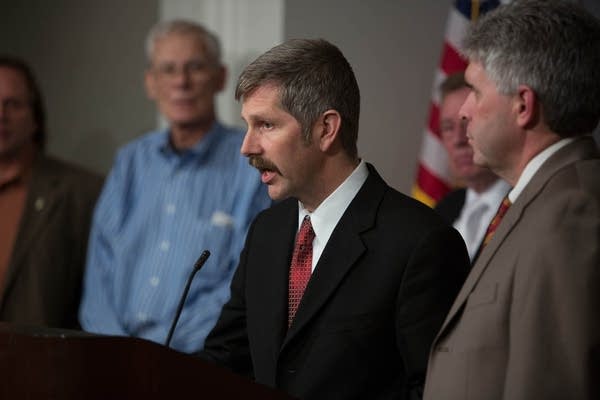Health care advocates on edge as GOP pushes budget cuts

Minnesota House Republicans recently unveiled a budget plan featuring a $2 billion tax cut and more education and transportation spending. To balance it, they proposed slashing health and human services.
Their plan will face scrutiny this week as the Legislature returns from its Easter/Passover break, but it's already unnerved some health care advocates. They worry a $1.1 billion cut to human services could harm many needy Minnesotans at time when the state projects a $2 billion surplus.
Some see the GOP's plan as a negotiating tactic as Republican leaders prepare for budget talks with Senate Democrats and Gov. Mark Dayton. Key Republican leaders, though, are signaling that it's no ploy and that cuts need to happen.
"We have a long history going back many years ... of the health and human services area growing and continually outstripping inflation," Ways and Means Committee Chair Rep. Jim Knoblach, R-St. Cloud, said during a recent hearing.
Create a More Connected Minnesota
MPR News is your trusted resource for the news you need. With your support, MPR News brings accessible, courageous journalism and authentic conversation to everyone - free of paywalls and barriers. Your gift makes a difference.

Higher education and other needs have suffered, he added, "because health and human services gets a larger and larger share."
The GOP's budget plan does increase the health and human services budget over current spending, but it would not pay for the projected need over the next two years. The GOP's point man on the issue is saying little about exactly where the cuts would come.
"It's a very steep hill to climb. There's no two ways about it. We understand that," said Rep. Matt Dean, R-Dellwood.
Dean has given some insight into his priorities. He has proposed eliminating the current MinnesotaCare program and directing the 95,000 people in the program to buy private insurance.
He's also suggested that there are ineligible people on MinnesotaCare, Medicaid and other taxpayer subsidized programs.

"We want to be able to take care of these folks and provide good health care but we have to absolutely get a handle on costs," Dean said. "Part of it is fraud and abuse. Part of it is verification of whether these people should be even getting these benefits."
Democrats say there's no way Republicans can cut more than $1 billion from health and human services without cutting needed services for the elderly, the poor and the sick.
"I'm really at a loss for how they're planning to accomplish this," said Sen. Tony Lourey, DFL-Kerrick, chairman of the Senate Health and Human Services Finance Committee. "It's hard to understand where a group can come from to say that when we have nearly $2 billion budget surplus that we would cut vulnerable families and children."

Senate Democrats are proposing to increase spending on health and human services by $341 million, Lourey said.
House Republicans have pledged to increase spending in one part of the HHS budget. They want to put about $160 million more into nursing homes. But that means cuts to hospitals, clinics and others who get state money could go deeper.
Rhonda Degelau, who directs the Minnesota Association of Community Health Centers, said she's concerned about cuts to Medicaid and MinnesotaCare.
She said 78 percent of her group's 180,000 patients across the state either have no insurance or are on Medicaid and MinnesotaCare. Cutting subsidized health insurance would only increase stress on their system, she added.
Clinics try to keep their doors open despite the budget situation, she said. "But the fact is that when there are cuts, they need to look at reducing services, reducing the number of hours that they're open and maybe even laying off staff."
News of a big budget surplus had hospitals hoping for a funding increase, said Wendy Burt, who represents the Minnesota Hospital Association.
Instead, hospitals will have to lobby House Republicans to protect what they have, she said. "It puts the stability of the whole health care delivery system in jeopardy."